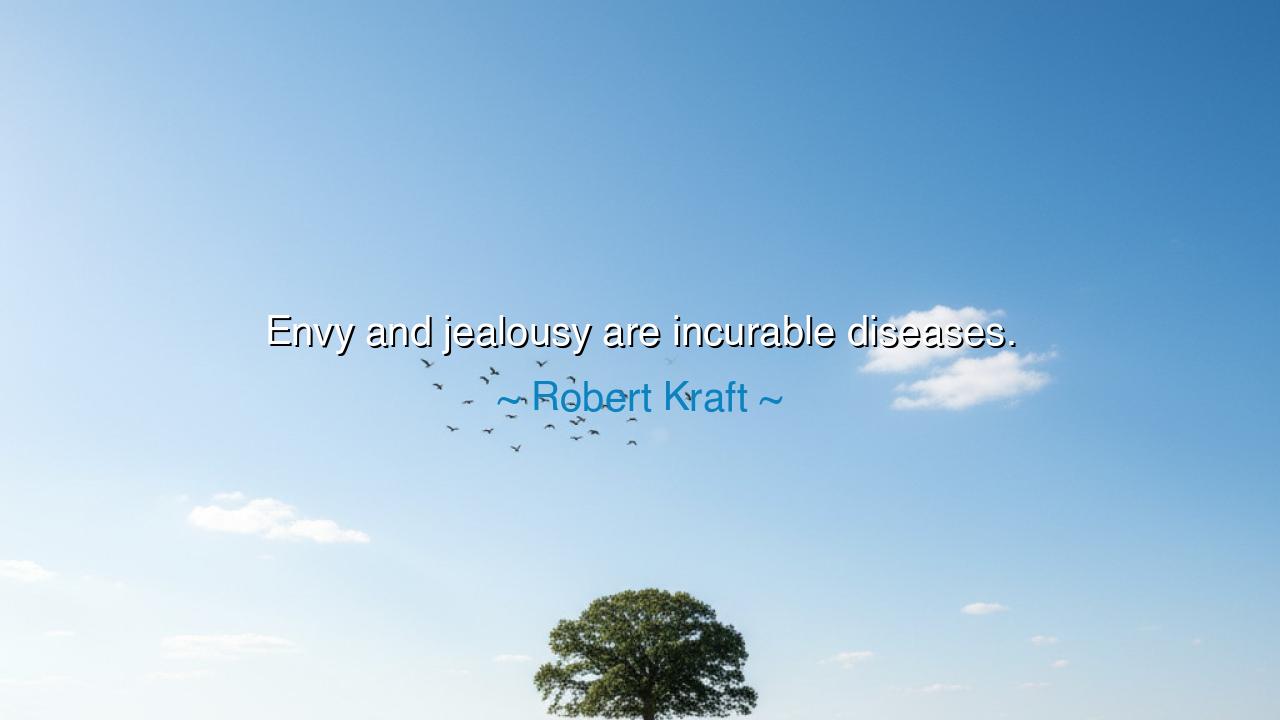
Envy and jealousy are incurable diseases.






There are poisons that the body cannot endure, and there are poisons that the soul cannot survive. Among these, Robert Kraft—a man of success tempered by reflection—named two with piercing accuracy: “Envy and jealousy are incurable diseases.” In these words lies not a simple warning, but a revelation of human nature as ancient as time itself. For envy and jealousy, once rooted in the heart, do not wound the world—they devour the very one who bears them. They are diseases of the spirit, feeding on pride and bitterness, leaving behind ashes where once there might have been peace.
The origin of this truth is as old as Eden. When Cain looked upon the favor that God showed his brother Abel, envy rose like smoke within him. It clouded his reason and hardened his heart, and in that blindness, he struck down his own blood. Thus, the first human death was not born of hunger or survival—but of jealousy. And so it has remained through the ages: kingdoms have fallen, friendships have shattered, and hearts have turned to stone under its weight. What makes envy incurable is that it feeds on comparison—a hunger that cannot be satisfied, for there will always be another more blessed, more praised, more loved.
Kraft, who walked among the powerful and the ambitious, understood how success itself becomes a mirror that reveals the sickness of others. Envy is not always loud; it smiles while it resents, flatters while it burns within. It is the disease of those who measure happiness not by their own blessings but by the blessings of others. And jealousy, its twin, is the fear of losing what one possesses, a shadow cast by the light of love or fortune. Together they gnaw at the heart, turning joy into suspicion and gratitude into grievance. They are incurable, not because healing is impossible, but because few will admit they are infected.
Consider the story of Julius Caesar and Brutus—the ruler and the friend. Brutus loved Caesar, but as Caesar’s glory grew, envy whispered in his ear that Rome no longer belonged to its people. What began as loyalty turned into jealousy masked as virtue. And so, the hand that once clasped Caesar’s in friendship became the hand that struck him down. Such is the nature of envy—it disguises itself in righteousness and convinces the heart that its poison is justice. Yet, in the end, Brutus found no peace, for envy destroys both the victim and the vessel that carries it.
To call envy and jealousy “diseases” is no mere metaphor. Like sicknesses of the flesh, they spread silently, weakening one’s vitality, stealing joy, and corrupting perception. A jealous mind cannot love purely, for it always fears betrayal. An envious heart cannot celebrate others, for it always feels robbed. The cure lies not in conquest or denial but in transformation—yet transformation begins only when the sufferer admits his ailment. And therein lies the tragedy: most souls would rather suffer than confess the truth of their envy.
Yet even in this grim reality, wisdom offers a path. Humility is the antidote that envy cannot withstand. Gratitude is the light that burns jealousy away. When one learns to see life not as a contest but as a communion of blessings, the disease begins to lose its grip. To admire rather than to covet, to rejoice rather than to compare—this is the way of the wise. For no one who is content with his own measure can ever be consumed by envy.
Let these words of Robert Kraft, then, be a warning and a remedy. Beware the subtle voice of envy when it whispers, “Why not me?” Beware the shadow of jealousy when it murmurs, “I may lose this.” For both are chains that bind the heart to misery. Instead, lift your gaze beyond comparison and let the success of others remind you of what is possible, not what is lost.
And finally, remember this sacred truth: a pure heart knows no envy, and a grateful spirit knows no jealousy. Those who master these poisons master themselves. But those who nurse them will find that no crown, no love, no triumph will ever satisfy. For envy and jealousy do not live in the world—they live in the soul. And until they are cast out by gratitude and grace, they will forever remain, as Robert Kraft so rightly said, “incurable diseases.”






AAdministratorAdministrator
Welcome, honored guests. Please leave a comment, we will respond soon